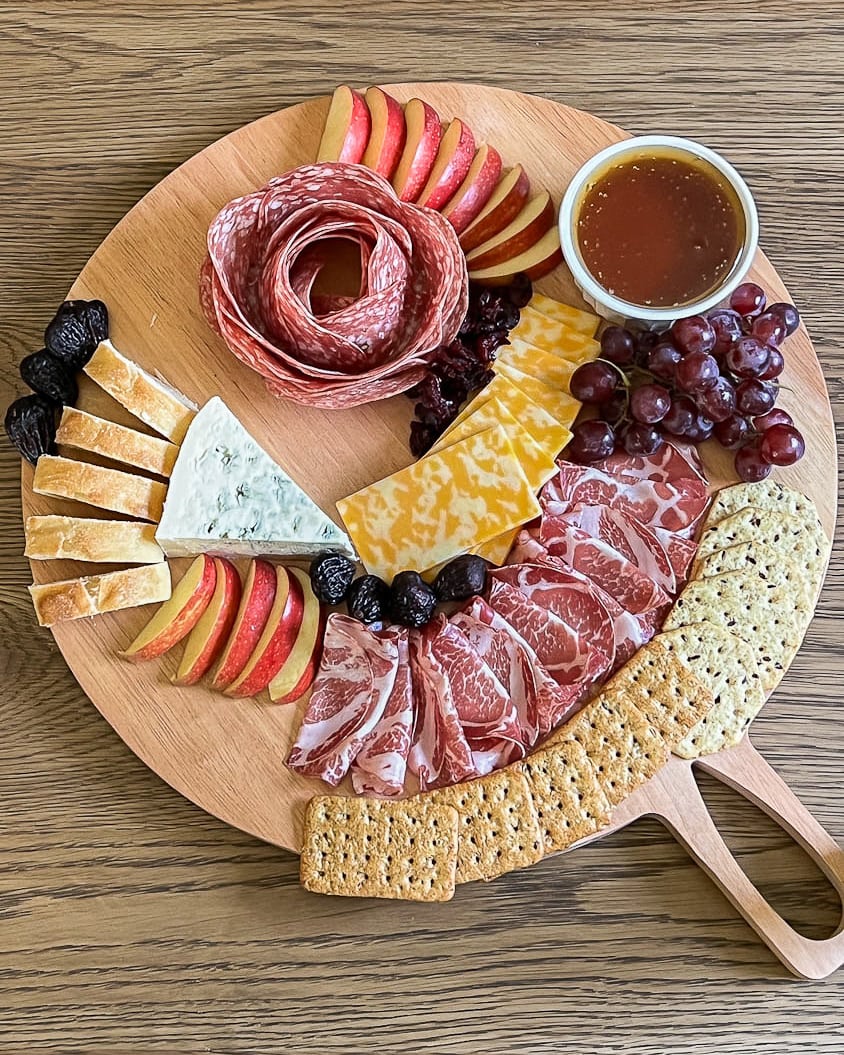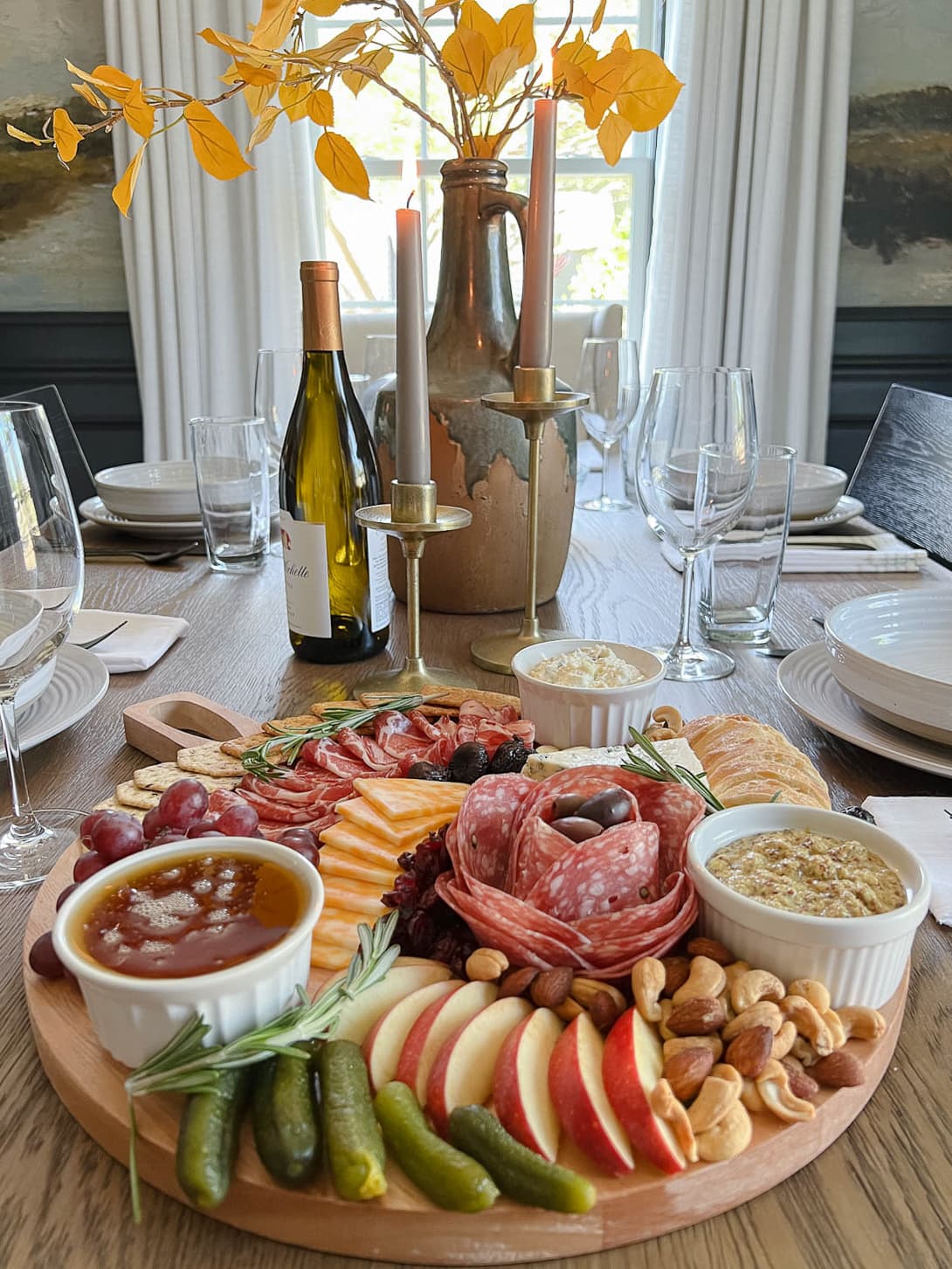
A beginner’s guide for making a simple DIY charcuterie board in minutes for any occasion with tips to make it look like a professional spread
Maybe most girls are excited about it being pumpkin spice season, but I’m just excited that it’s almost put-on-your-stretchy-pants-and-pig-out-at-home season.
Who am I kidding? That’s acceptable any time of year, at least in our house anyway.

The gatherings around the dinner table ramp up in the fall and into the holidays, and the biggest crowd-pleasers that Robert and I love throwing together around here are simple charcuterie boards.
Nothing theme-y or holiday specific. Just good ol’ snackage to nosh with people we love.
You’ve probably seen them all over Instagram and Pinterest at this point.
We serve them absolutely anywhere: by the pool, for backyard cookouts, family reunions, holiday parties, or a lazy evening when we just have random leftovers in the fridge.
The things I cook are nothing to write home about, but I’ve figured out the meat and cheese board / charcuterie board formula.
If the idea of making one has ever felt confusing to you, here’s a quick beginner’s guide with all you need to know so you can tailor it to what ingredients you already have and to your own tastebuds.
How to Make the Perfect Simple Charcuterie Board in Minutes
Charcuterie Board Shopping List
- Cured meats
- Cheeses
- Crackers and/or bread
- Fresh and/or dried fruits
- Fresh and/or pickled vegetables
- Nuts
- Dips and/or spreads

Choose a serving board, cutting board, or charcuterie platter appropriate for the size of your party or use multiple boards if you don’t have one large enough. Or use just a roll of brown heavy kraft paper. (You can even make your own DIY charcuterie board using scrap wood.)

1 | 2 | 3 | 4 | 5 | 6 | 7 | 8 | 9 | 10 | 11 | 12
1. Place Your Meat First
Prosciutto, salami, soppressata, ham, capricola, etc.
Start by placing 2-5 varieties of cured sliced meats space out around the board. Try fanning out folded meat slices to they’re easy to grab (I like to arrange meat slices around the rim of a drinking glass to make a flower shape and plop down on the board.)
2. Cheeses
Hard cheeses: gouda, cheddar, manchego, gruyere, swiss, etc.
Soft cheeses: brie, goat cheese, burrata, blue cheese, gorgonzola, havarti, etc.
Choose 2-5 varieties of cheeses, cubed or sliced if needed so they’re easier to grab, and fan them out around the board.

3. Bread and Crackers
Variety of crackers, toasted baguette slices, breadsticks, etc.
Space out crackers and breads around the perimeter of the board so they’re easy to grab.

4. Sweet Components
Fresh fruit: grapes, blackberries, raspberries, strawberries, apple, pear, etc.
Dried fruit: apricots, figs, cranberries, mango, etc.
Sweet dips: whipped honey, fig jam, chocolate hummus, orange marmalade, balsamic and olive oil, etc.
Slice whole fruits, cut grape bunches into small easy-to-grab segments, and place any “wet” fruits away from crackers or breads to prevent them from getting soggy.
Space ramekins or dip bowls around the board for any sweet dips or spreads.

5. Savory Components
Fresh vegetables: peppers, cucumbers, baby carrots, cherry tomatoes, blanched asparagus, etc.
Pickled or brined: cornichons, olives, pickles, pepperoncini, etc.
Savory dips: artichoke dip, whole grain mustard, olive tapenade, hummus, red pepper jelly dip, etc.
Place any pickled items or “wet” vegetables away from crackers or breads to prevent any sogginess, and put savory dips in more small bowls or ramekins dispersed around the board.

6. Fill in the Gaps
Fill any remaining gaps with nuts, more dried fruit, garnish with herbs of your choice, and put spoons in the dips and cheese knives in the cheeses for easy serving.

Charcuterie Presentation Tips
Get Creative With Seasons
Shape your cheeses into pumpkins for Halloween, place your charcuterie ingredients in the shape of a wreath for Christmas, and have fun with shapes, layouts, and ingredients for any holiday.
Lean Into Color
The more colors of the rainbow in a charcuterie board, the better. Focus on flavors of whatever fruits and vegetables are in season.
Focus on Balancing Flavors
As long as you have a mixture of textures and options on the board that represent savory, sweet, sour, bitter, salty, and spicy, you have a ton of different combinations that will suit the tastebuds of everyone you’re hosting.

I’m not even kidding when I say Robert and I just ate this easy charcuterie board for dinner. Because who really wants to cook anyways when you have an awesome spread like this?
Are you big on the charcuterie board at your house? We’ll find any and every excuse to make one.

More Hosting Ideas







